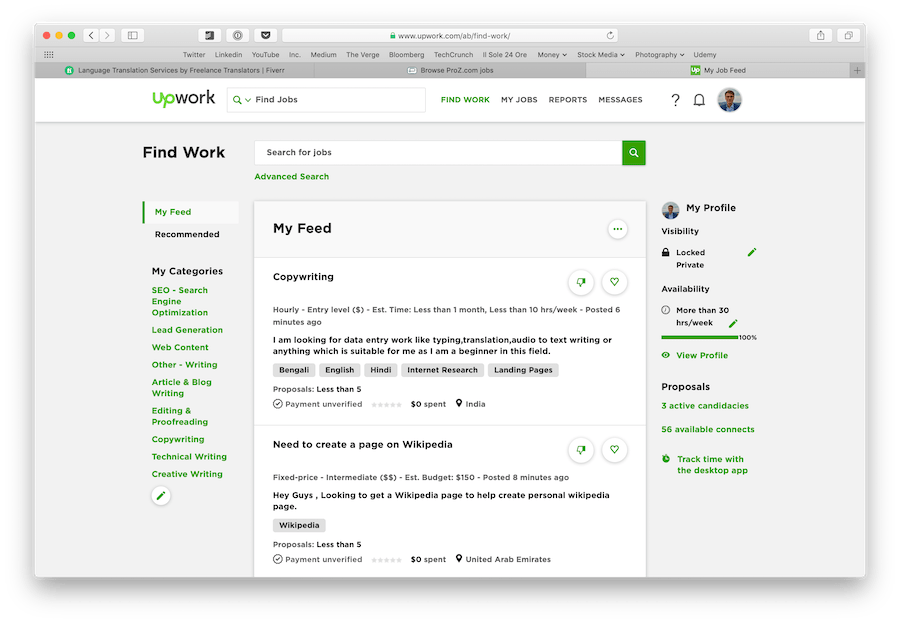In this article, we’re going to explore these mythical creatures. When you first sign up to a freelance translation website, it’s honestly baffling how many people you will see on there already, but don’t let this distract you from the main goal – providing high-quality translations for your prospects. Finding them might be hard, but when you do, you want them to stay. You can do this by leveraging the power of the following freelance translation websites:
Note: freelance translation websites usually charge 20% tax on your projects in order to let you use their system. It is a lot of money in the grand scheme of things, so take it for what it is. You should always try to build your own system after a while.
1. Fiverr

When you’re first starting out with translation, it’s extremely hard just to get paid, so platforms like Fiverr guarantee that you’re getting what you’re worth, every single time. If you’ve had the chance to work with clients directly, you know what I’m talking about. It’s not fun to run around asking for money all the time. Not at all.
So, Fiverr is a great place to start. It might not be the best place to grow your professional career, but you can definitely achieve great results in a small amount of time on here. Sometimes you get boring projects, sometimes you get amazing projects. Generally though, it’s one of the best freelance translation websites to start.
2. ProZ

This isn’t all bad obviously. I like to nit-pick on freelance translation websites that ask for a lot of data in return for their services, but ProZ truly is the professional platform you should be using when you come out of translation school. That’s because it’s one of the platforms where you’re most likely to get high-paying jobs.
No, you won’t get those on Fiverr. But you will get a higher volume of sales on there. So, it’s your choice. Do you prefer working “a lot” and make a little bit less for each word, or do you prefer taking some risks while building an amazing portfolio? I’d say a good balance between the two is necessary, especially for new translators.
3. Upwork

Upwork doesn’t treat freelance translators very nicely unfortunately. Most times, if you simply apply as a “freelance translator from [X] language to [X] language,” you’re going to be rejected. That happened to me when I first tried to get into their marketplace. You have to be smart. Market yourself as a niche player.
Upwork has its ups-and-downs. I do not believe it is the best platform for translation work anymore, but it does have its own perks. One of many is the ability to start hourly contracts, unlike Fiverr. Receiving payments via Upwork on a weekly basis is totally amazing and 100% secure. So why not try it out? Target a specific niche!
4. Freelancer.com

When it comes down to freelance translation websites, Freelancer.com has its own dedicated page, which you can find here. However, I do not personally love it, and I don’t have enough experience with it to tell you whether it is good or bad. What I can say is that Freelancer.com has a great reputation in terms of reviews and opinions.
So, you should take it from there. Do you think you have the reputation and “power” to choose your own clients? Then Freelancer.com might be for you. Are you just starting out? Then Fiverr might be a better choice. Overall, you’re looking at an Upwork-like provider that does it all in total security, so it’s not a bad choice.
5. Peopleperhour

If you want to try it out of the gate, go for it. Peopleperhour is a niche website that is very well-regarded for high-quality, precise workflows. Whatever your target industry, you will probably find it here. That’s because there are professionals who do not want anything to do with platforms such as Fiverr, where cheap labor is the norm.
If you’re looking for qualitative, long-term translation work, a freelance translation website like Peopleperhour might be the right choice for you. Just make sure to align your values with theirs. Brush up your CV and make it look amazing. Then upload it on the website together with any other certifications you might have collected.
6. Personal Blog or Portfolio

Create your own website with a website builder such as Squarespace or Wix. They don’t cost that much and they’re usually very easy to handle. It’s better to have something rather than be blind to the opportunities of the internet. Make sure you follow some best-practice guidelines before you do so. You don’t want to invest in something that won’t work over the years. Study a bit of SEO and content marketing.
Sure, it might not be your field of choice, but doing some basic competitor research is something that everybody should know how to do in our day and age. There are plenty of easy-to-understand references out there on the internet, and if you don’t follow their suggestions, you might be missing out on a whole world of possibilities.
These were six freelance translation websites to start making money from home. Sure, I cheated a little with the last one, but I truly believe you should apply some effort on your own, because that’s what will ultimately lead to the best results in your career. If you simply focus on what other platforms are doing, then you’ll be dependent on them.
If you know any other platforms that might help translators around the world increase their bottom line, let me know in the comments. I’m constantly analyzing these websites to learn more about the world of freelance translation, and I’d love to hear your opinion. Feel free to leave a comment down below and make sure to share this article with fellow translators!





Valuable information
but for me as a freelance translator with no past experience in dealing with such sites I need to start without registration cost and later when I gain some fees I will look for paid sites….please advise
all the best